BASIC was the "Ford Model T" of the programming languages, and so also for CP/M ...
BASIC is an older programming language. It was developed in 1964 at the Darthmouth College by John George Kemeny and Thomas Eugene Kurtz. If you're curious about the further history and the variations, take a look at the very good >wikipedia article<.
For CP/M, a few popular variations were created:
MBASIC (or BASIC-80) by MicroSoft
and
CBASIC by Digital Research (p-Code alike compiler only)
MBASIC was also sold as a compiler (BASCOM).
You can get the CP/M-80 versions (and also for CP/M-86) at the >retroarchive page<.
A mirror exists at >classiccmp.org< ....
Nevada BASIC was less commonly used, but also less expensive, and can be download in two versions from here: >Nevada BASIC 2.1< and >Nevada BASIC 2.5<.
SBASIC stands for "structured BASIC" and was (at least) sold with Kaypro machines.
It's similar to COMAL (which looks like BASIC married with PASCAL), and it dislikes line numbers. Give it a try by downloading it from >here<.
Tiny BASIC was published in a first version with source code in 1976 (DDJ magazine). A version 3.1 can be download from my mirror >here< (see also Simtel CPMUG002 disk).
Remember, to exit the interpreter, you have to use 'BYE' instead of 'SYSTEM'.
BASIC/E was the predecessor of CBASIC, "an early candidate".
Like Tiny BASIC, it was less common used and has also some limitations. Version 2.3 can be download from my mirror >here< (see also Simtel CPMUG005 disk, there is also a compiler included).
BCBC was a small BASIC compiler written from Bruce Tonkin in 1984. It produces assembler source code for ASM or MAC, Intel 8080 mnemonics were used. It was also published 1986 in SimTel 20 Area. Download it >here<.
Three (M)BASIC pre-processors for CP/M were offered also, see >here< (nested ZIP).
(Mallard BASIC and BBC BASIC was also available for CP/M, but I'm not sure about the source for it ...)
To be honest, may be other, rare BASIC variations for CP/M exist also, but I do not want to list them all here. If you think there is one worth to be mentioned here also, do not hesitate to write an email ;-)
A very famous BASIC program - SUPER STAR TREK
The most famous BASIC programs were adapted by David Ahl, and were published in his book "101 Basic Computer Games".
I have preserved a version (very close to the original listing) running with MBASIC >here<. Take a look at the second BASIC page also.
Also, to get an impression how it looks, I have prepared some screenshots:
Loading and starting is very simple:
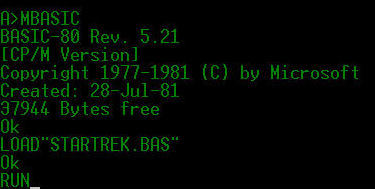
A beautiful (for these times) title screen follows:
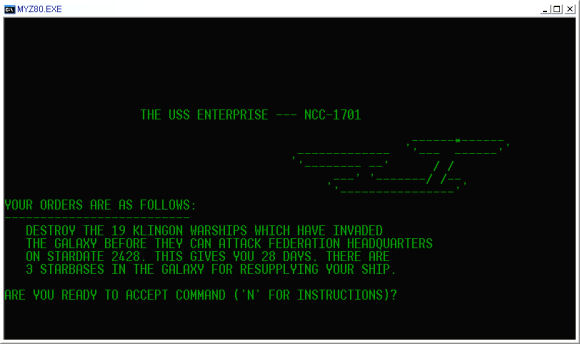
If you enter 'N' you will get instructions by a chained 2nd BASIC program:
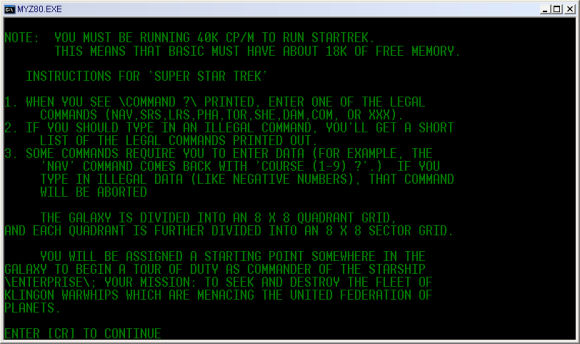
After getting all instruction pages, you come back to the beginning of the game.
You have to type in a three-character command. 'NAV' for example was to navigate within all quadrants (64 in total, 8x8 placed) and sectors (8x8 fields).
The course has to be set with eight digits, '6' stands for south-west. You have also to enter the speed you want to fly, WARP factor 1 means one quadrant, fractions of 1 means flying within the sector:
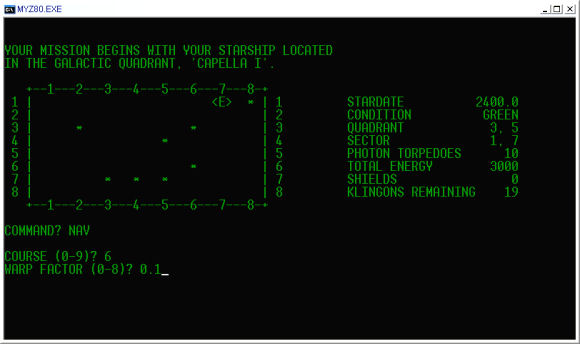
The result of the above navigation parameters looks like this:
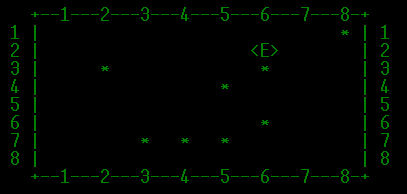
You can go on with other commands to detect the Klingons, but I will not reveal all things here, fun to discover will disappear quickly :-) .
Exit the program by entering 'XXX' as the command.
If you are curious about several other variants of the SUPER STAR TREK, just take a look at the interesting Star Trek (the game) pages http://www.dunnington.info/public/startrek/ and http://outserv.cactus.org/~nystrom/startrek.html or for an overview, at http://www3.sympatico.ca/maury/games/space/star_trek.html.
|

